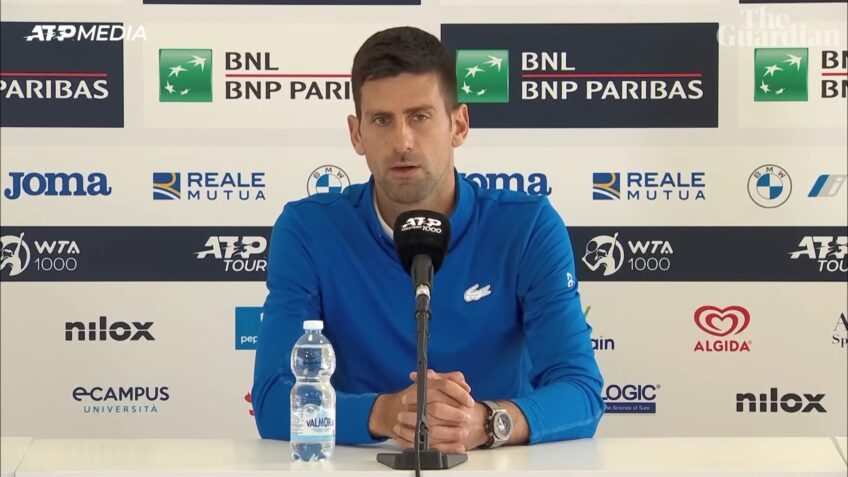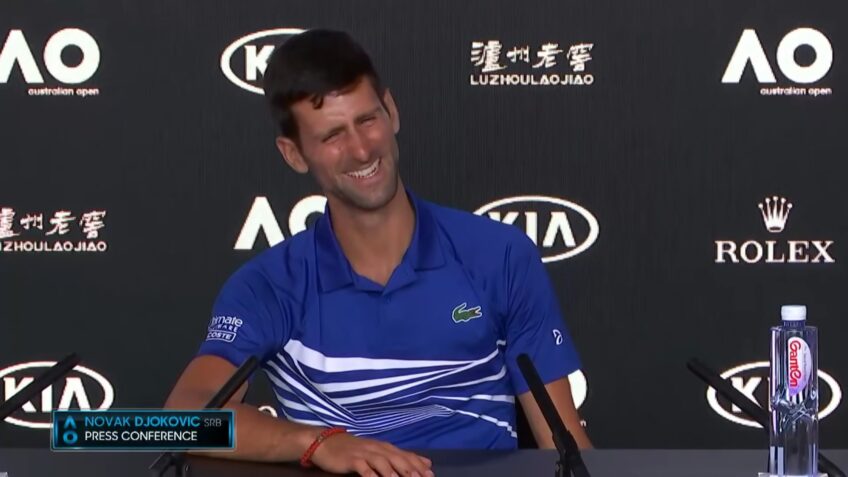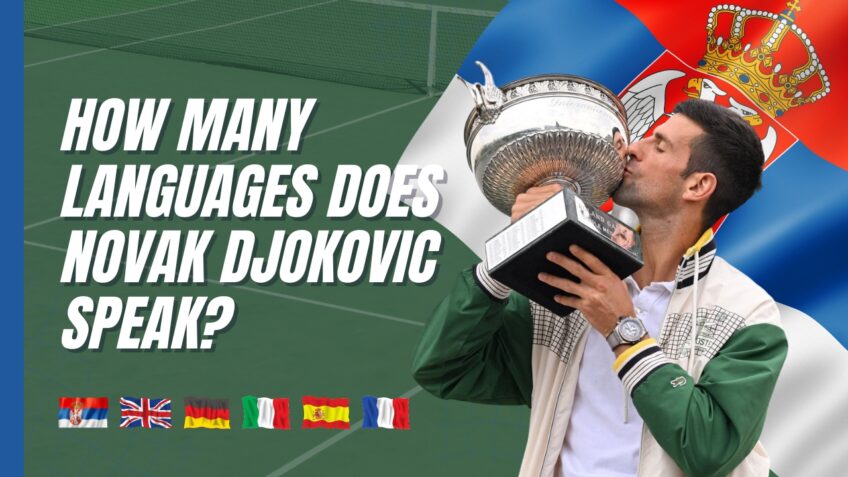Novak Djokovic, the Serbian tennis maestro, has long been admired for his exceptional skills on the court. With numerous Grand Slam titles and a legacy that is sure to endure for generations, Djokovic has solidified his position as one of the greatest tennis players of all time. But did you know that he is also a linguistic prodigy, adept at speaking multiple languages fluently? In this blog post, we will delve into the remarkable language skills of Novak Djokovic, exploring how many languages he speaks and the stories behind his linguistic prowess.
How Djokovic’s linguistic abilities set him apart from his peers

His linguistic abilities have undoubtedly set him apart from his peers in the world of tennis. He is known to speak several languages fluently, including Serbian, English, German, Italian, French, and Spanish. His proficiency in multiple languages has allowed him to communicate effectively with fans, media, and other players from different parts of the world. Moreover, he has often used his linguistic abilities to his advantage, both on and off the court.
In his interviews and speeches, he is able to connect with his audience in a way that few athletes can, by speaking to them in their native language. This has helped him build strong connections with his fans, especially those from non-English speaking countries. His ability to speak multiple languages has also helped him in his sponsorship deals and media coverage. By being able to communicate with journalists from different parts of the world, he has been able to increase his international exposure and build a global fan base.
Serbian
Unsurprisingly, Serbian is Djokovic’s mother tongue. Born and raised in Belgrade, Serbia, he grew up speaking this Slavic language with his family and friends. Serbian, which is closely related to Croatian and Bosnian, is an official language in Serbia and is spoken by around 12 million people worldwide.
English
As an international tennis superstar, Djokovic quickly recognized the importance of learning English to communicate with fans, the media, and fellow players. He is now fluent in English, often using it during interviews, press conferences, and social media updates. Djokovic’s proficient command of English allows him to engage with fans and the tennis community on a global scale.
German
In addition to Serbian and English, Djokovic also speaks German fluently. His passion for learning German can be traced back to his early years, when he spent time training at the Pilic Tennis Academy in Munich, Germany. Djokovic’s fluency in German has not only helped him connect with fans in Germany and Austria but also fostered a deeper understanding of European culture and history.
Italian
Djokovic’s affinity for the Italian language began during his frequent visits to Italy for tennis tournaments. Italian, a Romance language spoken by around 85 million people globally, is renowned for its musicality, expressiveness, and cultural significance. Djokovic’s fluency in Italian has enabled him to connect with his Italian fans more intimately, and he often conducts interviews and interacts with fans in their native tongue.
Spanish
Spanish, the second most spoken language worldwide, is another language Djokovic has mastered. Given the prevalence of Spanish-speaking tennis players and fans, it’s no surprise that Djokovic chose to learn this Romance language. His fluency in Spanish allows him to converse with players like Rafael Nadal and Juan Martin del Potro, as well as build rapport with fans from Spain, Latin America, and beyond.
French
As the official language of one of the four Grand Slam tournaments, French is an essential part of any tennis player’s linguistic arsenal. Djokovic has won the French Open, held at Roland Garros, on multiple occasions, and his ability to speak French has only deepened his connection with the French tennis community. Djokovic’s French skills were showcased during his victory speeches and interactions with fans at Roland Garros.
Connecting with Fans and Breaking Barriers
His linguistic skills have not only enabled him to communicate with fans and players from diverse backgrounds but also broken down cultural barriers, fostering a sense of unity within the tennis community. Djokovic is known to spontaneously address crowds in their native languages during trophy presentations and post-match interviews, delighting fans and solidifying his status as a true global ambassador for the sport.
Moreover, Djokovic’s ability to speak multiple languages has allowed him to build bridges with people from different cultures and backgrounds, promoting mutual understanding and respect. His language proficiency has not only helped him excel on the court but also off the court, as he engages in philanthropy and humanitarian work, such as the Novak Djokovic Foundation, which aims to improve the lives of children in Serbia and other countries.
The Secret to Djokovic’s Linguistic Success
So, what is the secret behind Djokovic’s remarkable ability to learn and speak so many languages? The answer may lie in his dedication, discipline, and passion, traits that have fueled his rise to tennis stardom. Djokovic has often spoken about the importance of hard work and perseverance, both on and off the court, and these qualities have no doubt contributed to his linguistic achievements.
Furthermore, it’s worth noting that learning multiple languages can be an incredibly enriching and rewarding experience. In Djokovic’s case, his language skills have not only allowed him to better understand the world and its people but also shaped his personal and professional growth. This may inspire others to follow in his footsteps and learn new languages, opening up new doors and opportunities in their own lives.
The Intersection of Language and Sports Media Coverage

In the world of sports, language plays an important role in media coverage. Novak Djokovic, a multilingual tennis player, has used his language skills to connect with fans and media outlets from around the world. By speaking multiple languages, Djokovic has been able to communicate with a wider range of people, including those who do not speak English, the primary language of the tennis world. It also affects how athletes are covered in the media.
The ability to speak multiple languages allows athletes to communicate more effectively with journalists and fans in different parts of the world. This can lead to more positive media coverage and help build a larger fan base. Language can also impact how athletes are perceived by the public. A multilingual athlete like Djokovic can be seen as more cultured and worldly, which can increase their appeal to fans and sponsors alike.
Djokovic’s multilingual interviews and speeches
He has impressed fans and critics alike with his multilingual interviews and speeches. He is fluent in several languages, including Serbian, English, French, Italian, German, and Spanish. He often conducts interviews and delivers speeches in multiple languages, depending on the audience and location. His linguistic abilities have not only helped him communicate effectively with fans and media from different countries but also helped him forge connections with players from diverse backgrounds.
He has frequently been seen conversing in different languages with fellow players on and off the court. Moreover, Djokovic’s language skills have also enabled him to represent his country and promote tennis in Serbia to a wider audience. He has served as an ambassador of Serbian culture and language during international events, such as the Olympic Games.
FAQs
How do Djokovic’s language skills reflect his dedication and discipline?
His ability to learn and speak six languages fluently showcases his discipline, commitment, and hard work, traits that have also fueled his rise to tennis stardom.
Can Djokovic’s linguistic abilities be attributed to his upbringing?
While growing up in Serbia laid the foundation for his language skills, Djokovic’s experiences and opportunities throughout his tennis career have played a significant role in developing his linguistic prowess.
How have Djokovic’s language skills influenced other tennis players?
Djokovic’s linguistic abilities may inspire other tennis players to learn new languages, opening up new avenues for communication and cultural understanding within the sport.
Do Djokovic’s language skills make him a better ambassador for the sport of tennis?
Yes, his multilingualism allows him to connect with a wider audience, break down cultural barriers, and promote unity and sportsmanship in the tennis community, making him an excellent ambassador for the sport.
Conclusion
His incredible linguistic skills are a testament to his dedication, passion, and curiosity. Speaking six languages fluently – Serbian, English, German, Italian, Spanish, and French – Djokovic has truly distinguished himself both on and off the tennis court. His multilingualism has enabled him to connect with fans from all corners of the globe and break down cultural barriers, embodying the spirit of unity and sportsmanship that lies at the heart of tennis.
In a world that is increasingly interconnected, Novak Djokovic’s mastery of languages serves as a shining example of the power of communication, understanding, and empathy. As we celebrate his accomplishments in the world of tennis, let’s also appreciate his exceptional language skills, which continue to inspire and unite people from all walks of life.

